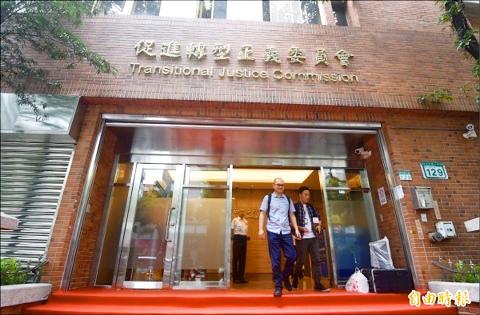The Transitional Justice Commission yesterday said it has researched military prisons that the Ministry of National Defense used during the White Terror era.
The commission studied the history of seven facilities over the past six months and has begun making plans to establish memorials at each, commission spokeswoman Yeh Hung-ling (葉虹靈) said.
The research would provide a template for the commission’s future dealings regarding “sites of injustice,” she said.

Photo: Chen Yu-fu, Taipei Times
The former Counterintelligence Bureau’s Taoyuan Correction and Training Facility, a “black site” located in Taoyuan’s Lujhu District (蘆竹), has survived intact, the commission said.
Before being commandeered by the bureau to be used as a secret prison, the traditional Minnan (閩南) compound was the ancestral home of former Taoyuan County commissioner Hsu Chung-te (徐崇德), it said.
Hsu’s family was allowed to live in half of the compound, while prisoners were kept in the other half, the commission said.
The bureau used the prison for alleged traitors from its own ranks and senior military officers who had incurred Chiang Kai-shek’s (蔣介石) wrath, such as Lee Hung (李鴻), a decorated commander who Chiang expelled from the army for befriending his rival, general Sun Li-jen (孫立人), it said.
The prison apparently remained in use until 1958, when the bureau relocated the program to the so-called “Wolung Mansion” (臥龍山莊) in the city’s Longtan District (龍潭), it said.
The Lujhu property is owned by a private citizen and the remains of sentry posts can still be seen, while the Wolung Mansion was demolished to build the Taoyuan Armed Forces General Hospital, it said.
The euphemistically named “Fongshan Guesthouse” (鳳山招待所) in Kaoshiung’s Fongshan District (鳳山) is one of three intact prison facilities used in the city during the White Terror era, it said.
The facility was a detention and interrogation center for sailors and other political prisoners in the navy’s custody, the commission said.
Built by Japan as a wireless communication hub, the facility is now a national historical heritage site, it said.
Kaohsiung’s two other military prisons can be found at Shoushan Military Base (壽山營區), and were operated by the Taiwan Garrison Command and the Southern Region Reserve Command, the commission said.

An essay competition jointly organized by a local writing society and a publisher affiliated with the Chinese Communist Party (CCP) might have contravened the Act Governing Relations Between the People of the Taiwan Area and the Mainland Area (臺灣地區與大陸地區人民關係條例), the Mainland Affairs Council (MAC) said on Thursday. “In this case, the partner organization is clearly an agency under the CCP’s Fujian Provincial Committee,” MAC Deputy Minister and spokesperson Liang Wen-chieh (梁文傑) said at a news briefing in Taipei. “It also involves bringing Taiwanese students to China with all-expenses-paid arrangements to attend award ceremonies and camps,” Liang said. Those two “characteristics” are typically sufficient

A magnitude 5.9 earthquake that struck about 33km off the coast of Hualien City was the "main shock" in a series of quakes in the area, with aftershocks expected over the next three days, the Central Weather Administration (CWA) said yesterday. Prior to the magnitude 5.9 quake shaking most of Taiwan at 6:53pm yesterday, six other earthquakes stronger than a magnitude of 4, starting with a magnitude 5.5 quake at 6:09pm, occurred in the area. CWA Seismological Center Director Wu Chien-fu (吳健富) confirmed that the quakes were all part of the same series and that the magnitude 5.5 temblor was

The brilliant blue waters, thick foliage and bucolic atmosphere on this seemingly idyllic archipelago deep in the Pacific Ocean belie the key role it now plays in a titanic geopolitical struggle. Palau is again on the front line as China, and the US and its allies prepare their forces in an intensifying contest for control over the Asia-Pacific region. The democratic nation of just 17,000 people hosts US-controlled airstrips and soon-to-be-completed radar installations that the US military describes as “critical” to monitoring vast swathes of water and airspace. It is also a key piece of the second island chain, a string of

The Central Weather Administration has issued a heat alert for southeastern Taiwan, warning of temperatures as high as 36°C today, while alerting some coastal areas of strong winds later in the day. Kaohsiung’s Neimen District (內門) and Pingtung County’s Neipu Township (內埔) are under an orange heat alert, which warns of temperatures as high as 36°C for three consecutive days, the CWA said, citing southwest winds. The heat would also extend to Tainan’s Nansi (楠西) and Yujing (玉井) districts, as well as Pingtung’s Gaoshu (高樹), Yanpu (鹽埔) and Majia (瑪家) townships, it said, forecasting highs of up to 36°C in those areas